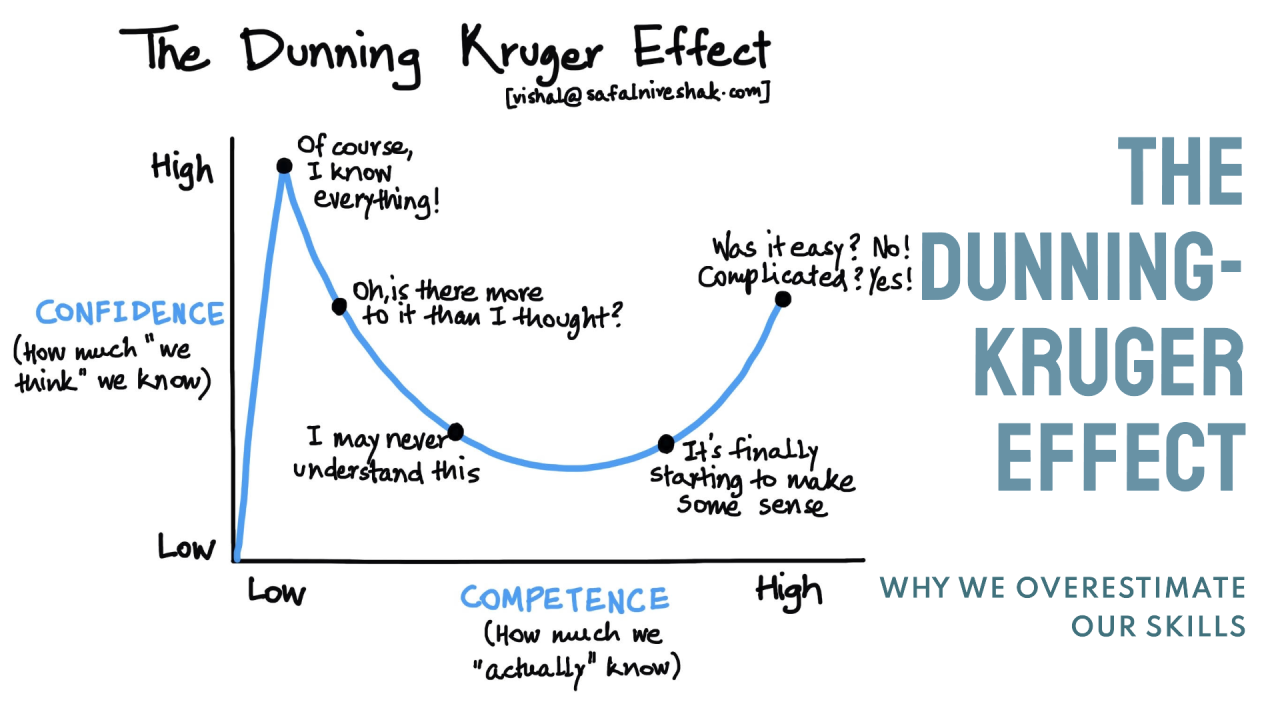Dunning–Kruger Effect
What is it?
The Dunning–Kruger Effect is a cognitive bias where people with low ability or knowledge in a particular area overestimate their competence, while those with high ability tend to underestimate theirs.
The Dunning–Kruger effect happens when people with low skill or knowledge in something think they are much better at it than they actually are. Meanwhile, experts might underestimate their own abilities because they assume others know just as much.
Key Idea:
- Low Skill = High Confidence: Beginners often don’t know enough to realize what they don’t know, so they overestimate their skills.
- High Skill = Lower Confidence: Experts are aware of the complexities and may doubt themselves, even though they are highly skilled.
Simple Examples:
1. The Singing Contest Example:
- A person who sings terribly at karaoke might believe they sound amazing because they can't hear their mistakes.
- Meanwhile, a professional singer might stress over tiny flaws in their performance that most people wouldn’t notice.
2. The DIY Home Repair Example:
- Someone with no plumbing experience might feel confident about fixing a leaking pipe after watching one YouTube video.
- A professional plumber might hesitate or double-check their work because they know how many things could go wrong.
3. The Student Example:
- A student who barely studied for an exam might leave the test room saying, "That was easy! I aced it!"
- A well-prepared student might worry, "I hope I didn't miss something obvious."
In short: A little knowledge can be dangerous because it often comes with a lot of confidence.
Definition and Core Mechanism
The Dunning–Kruger effect, described by David Dunning and Justin Kruger in their 1999 paper, is a cognitive bias where individuals with low competence in a specific domain overestimate their abilities, while those with high competence often underestimate theirs. This bias stems from metacognitive deficits, where individuals lack the self-awareness to recognize their own shortcomings.
Cognitive Foundations
1. Metacognition and Self-Assessment:
- Metacognition refers to one's ability to evaluate their knowledge and performance accurately.
- Those with low ability often lack the skill to self-assess, leading to inflated self-confidence.
2. The Illusion of Competence:
- Inexperienced individuals often mistake familiarity (e.g., recognizing terms or concepts) for understanding, leading to misplaced confidence.
3. The Imposter Syndrome:
- At the opposite end, highly competent individuals might suffer from Imposter Syndrome, where they undervalue their expertise, assuming others have similar or greater knowledge.
Related Psychological Phenomena
1. Overconfidence Bias:
People systematically overestimate their knowledge or skills, especially in unfamiliar situations.
2. Cognitive Biases and Heuristics (Tversky & Kahneman, 1974):
The availability heuristic and confirmation bias often reinforce false beliefs about one’s competence.
3. The completely made up Dunning-Kruger Effect Curve:
The graphical representation (which is made-up and not scientifically proven) shows initial overconfidence among novices, followed by a “valley of despair” as competence grows, and eventually, realistic self-assessment at expert levels.
 Linkedin Post watch this video also : Youtube- The Irony of the Dunning-Kruger Effect
Linkedin Post watch this video also : Youtube- The Irony of the Dunning-Kruger Effect
References
- Dunning, D., & Kruger, J. (1999). Unskilled and unaware of it: How difficulties in recognizing one's own incompetence lead to inflated self-assessments. Journal of Personality and Social Psychology, 77(6), 1121–1134.
- Tversky, A., & Kahneman, D. (1974). Judgment under uncertainty: Heuristics and biases. Science, 185(4157), 1124–1131.
- Burson, K. A., Larrick, R. P., & Klayman, J. (2006). Skilled or unskilled, but still unaware of it: How perceptions of difficulty drive miscalibration in relative comparisons. Journal of Personality and Social Psychology, 90(1), 60–77.